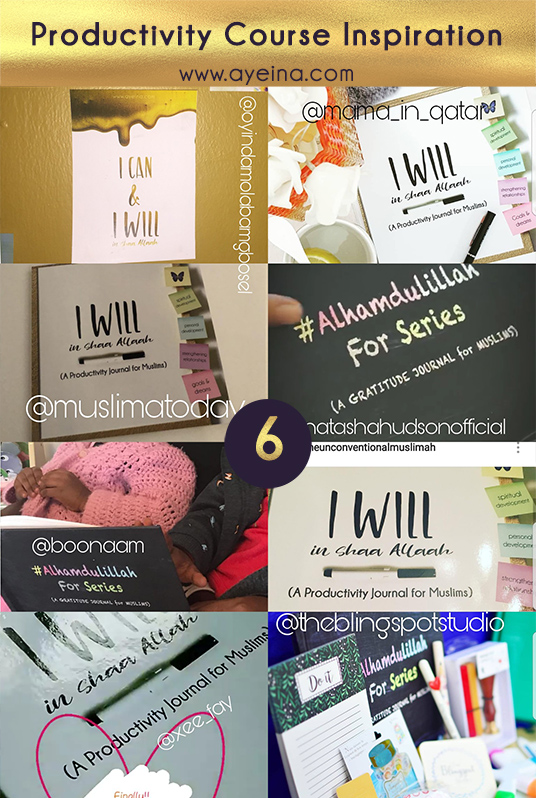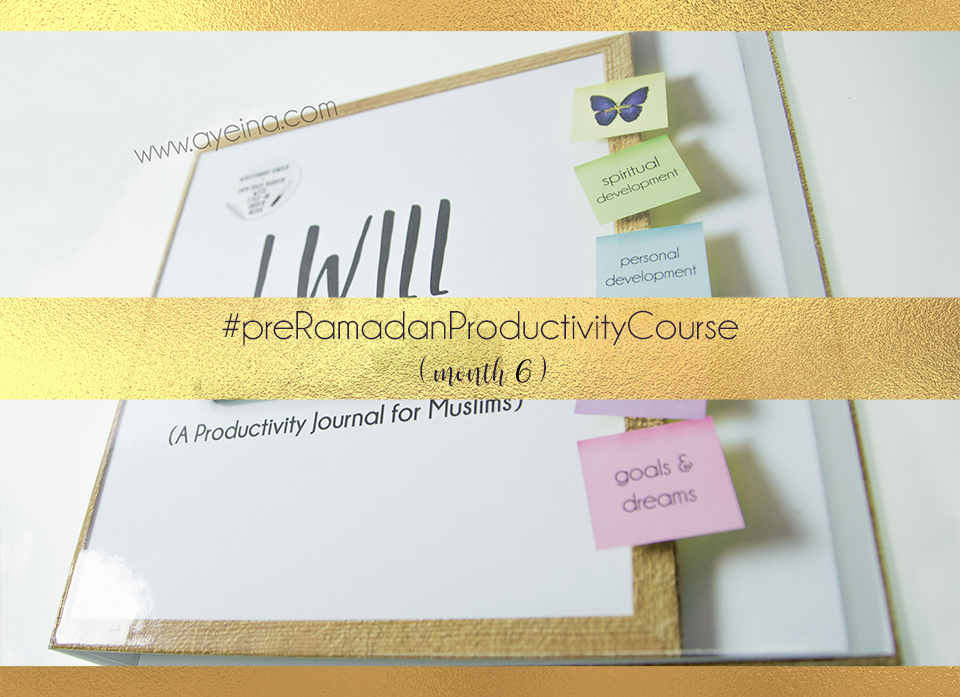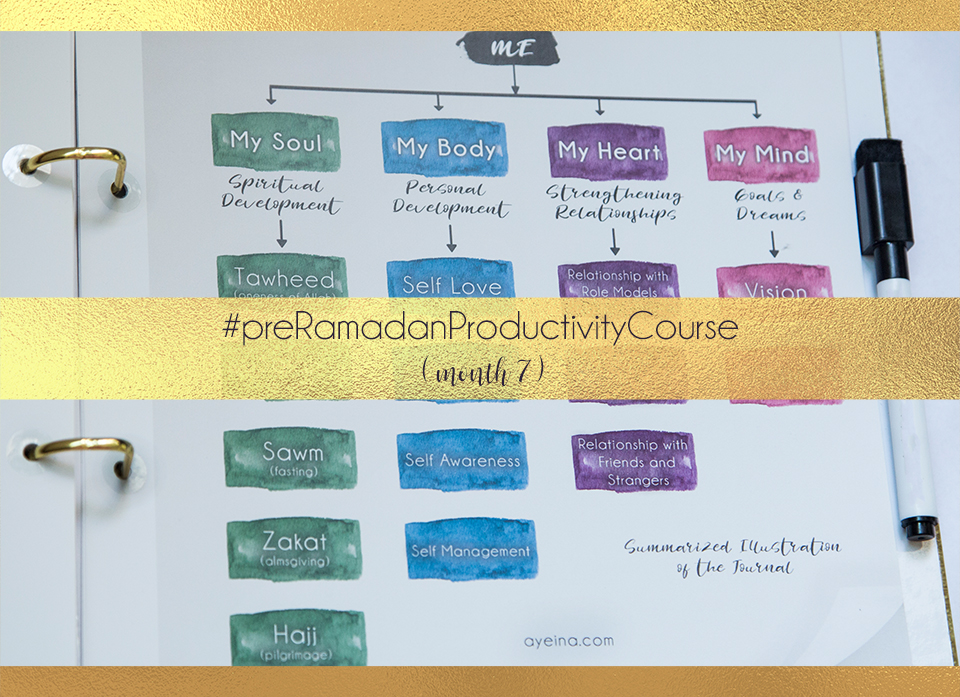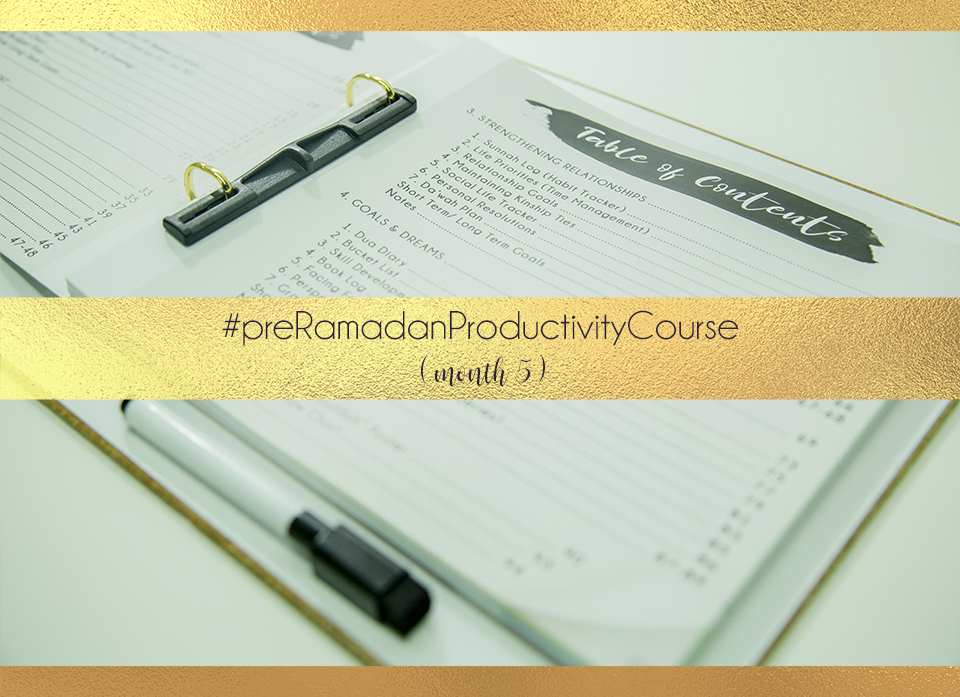———————————————————————————————————————————————————
PREVIOUS – Productivity 5: Fasting Plan, Self Care, Sunnah & Skill Development
———————————————————————————————————————————————————
We started this 7 month Pre-Ramadan Productivity Course in the start of October (And if you will be reading this afterwards, this is the 6th month of #preRamadanProductivityCourse – as a detailed guide on the PRODUCTIVITY JOURNAL FOR MUSLIMS – although you can choose any topic in any month or week, this is simply how we did it and we hope that it helps make things more clear and doable for you in shaa Allah).
Since we pick out 1 section from each category in the journal each month (we will do this till April 2018 in shaa Allah): 1 from Spiritual Development, 1 from Personal Development, 1 from Strengthening Relationships & 1 from Goals and Dreams – In March 2018, we picked topics of discussion like: Hajj Budget Plan (to help us track our finances so we can save money for Hajj), Health Goals (defining our daily, weekly and monthly goals on our physical health as an extension of our previous challenge ‘self care’), Social Life Tracker (strengthening positive influences around us and subtracting toxic people from our life (online or offline)) and Bucket List (making a list of dreams and experiences you want to achieve in life).

The reason we are doing it all publicly with YOU is because we are struggling as much as you are in this life and this will help us stay accountable if we lose the motivation somewhere in the middle! Also, we want to enter Ramadan as a better Muslim and experience the blessed month on a whole new level in shaa Allah.
We did a detailed post on each section in this month and in shaa Allah will be doing so for the next few months as well – collaborating with different bloggers and entrepreneurs who are experts/researchers of those topics! Here are some of the examples of people from different parts of the world doing the challenge with us ❤

1) Hajj Budget Plan
(spiritual development)
Challenge 1 from *Spiritual Development* was “Hajj Budget Plan” in #PreRamadanProductivityCourse – A lot of us dream to perform Hajj but think that we can’t afford it. While in most cases, it may be the truth, but sometimes the reasons behind the inability to reach that goal is:
1) We have a luxurious lifestyle and we can’t compromise on that to be able to save for Hajj.
2) We have no set plan on how to save for this very important obligation.
3) We think we have a lot of time in our lifetime and one day (when we are old), we will go do the hajj.
4) We don’t know the importance of this basic pillar of Islam and hence keep delaying it.
5) We don’t know how to shop smart and think we can’t reach such big goal with such small savings. (Hence we keep waiting for a large sum of extra money).
6) We have huge amount of debts and installments/mortgages etc. to pay off. And since Hajj can’t be done on loans etc., we are stuck in the situation for a long period of time. Sometimes generations are born with the burden of debt on their shoulders.
7) We think we lie in the category of those on whom there’s no obligation because our financial situation isn’t the best one.
Although going to hajj isn’t a romantic getaway per se, but for newlyweds, it’s a great way to start their new life filled with blessings 💞Usually parents keep saving money all their lives for their kids’ marriages while couples keep saving for their honeymoon. And not that there is anything wrong with that if you can afford it – but ask yourself:
Are you buying things you don’t need? From the money you don’t have? To impress people you don’t like? If you’re nodding because that last line was too brutally honest, then it’s time to reevaluate whether you can spend for something more important and deep in life instead?
An average cost for marriage is above $20,000 USD approximately while the average cost for hajj is approximately $10-20,000 USD. I know marriage feels like once in a lifetime kind of an experience, but so is hajj. And even though they are not interrelated really, but just saying…if we are able to save so much for a marriage ceremony, in shaa Allah we will find ways to save for this obligation as well. And not to mention, each time you save even a penny, you will be rewarded for your intentions and efforts. That’s the beauty of our religion subhaanAllah! We get rewarded even if we are not able to achieve the desired results. We get rewarded simply for thinking of doing a good deed! Alhamdulillah.
“Whosoever intended to perform a good deed, but did not do it, then Allah writes it down with Himself as a complete good deed. And if he intended to perform it and then did perform it, then Allah writes it down with Himself as from ten good deeds up to seven hundred times, up to many times multiplied. And if he intended to perform an evil deed, but did not do it, then Allah writes it down with Himself as a complete good deed. And if he intended it and then performed it, then Allah writes it down as one evil deed.” [Bukhari & Muslim]
2) Health Goals
(personal development)
Challenge 2 from *Personal Development* was “Health Care Goals” in #preRamadanProductivityCourse – not only for yourself but also for kids as healthy eating habits are rare in such era where junk food is readily available at such an affordable price while healthy organic food takes double the amount from your pockets.
Messenger of Allah (ﷺ) said, “A strong believer is better and dearer to Allah than a weak one, and both are good. Adhere to that which is beneficial for you. Keep asking Allah for help and do not refrain from it…” [Muslim]
How to Encourage HEALTHY EATING HABITS in Kids:
1) GET KIDS IN THE KITCHEN:
As @zallibhai writes in her blogpost: “We want the next generation to eat right, make wise choices, and develop a healthy love for food. There seems to be no better way to do this than to invite our kids into the kitchen with us from a young age. Similar to my approach with them when it comes to fitness (encouraging them to play, choose their own activities, and playing along with them), cooking with the kids can be a fun, interactive, and engaging activity. Not only does it teach them basic kitchen skills, they also learn about nutrition, creativity and even a little bit of math and science.”…
2) MAKE IT FUN!
“Be silly, role-play and just have fun. These are skills you want your kids to have for a lifetime and associating it with great memories will only help grow these skills…Let them use their hands and make a little mess. Let them get creative, make different shapes with their food and let them try different food combinations.”
3) MAKE TIME IN THE KITCHEN AS A TIME TO TEACH
“Just don’t tell your kids that 😉 … Even if your child is a super picky eater, it’s perhaps even more valuable getting them chopping and prepping in the kitchen. There are certain things my son won’t eat, but he’s ok helping prepare them and he’s actually more likely to try those foods again after he’s helped prepare them (says zehra)”
4) MAKE ONLY HEALTHY SNACKS AVAILABLE
The more the temptation of unhealthy snacks around, the more they’d want them! You have to be their role model!
5) INTRODUCE NEW FOODS SLOWLY:
Children are new-food-phobic by nature so one step at a time! ❤ May be start with adding them in smoothies and cakes etc. and then shift to the raw form later.
6) DON’T GIVE UP
Most children need multiple exposures (between 5 and 10) to try new foods.
3) Tracking Social Life
(strengthening relationships)
Challenge 3 from *Strengthening Relationships* was “Social Life Tracker” in #preRamadanProductivityCourse – SOCIAL LIFE TRACKER is all about strengthening positive influences around us and subtracting toxic people from our life (online or offline).
اللَّهُمَّ إِنِّي أَسْأَلُكَ حُبَّكَ وَحُبَّ مَنْ يُحِبُّكَ وَالْعَمَلَ الَّذِي يُبَلِّغُنِي حُبَّكَ
(Allāhumma innī as’aluka ḥubbaka wa ḥubba man yuḥibbuka wal-`amalalladhī yuballighunī ḥubbak…)
‘O Allah, indeed, I ask You for Your love and the love of those who love You, and for the action that will cause me to attain Your love…’
الْمَرْءُ مَعَ مَنْ أَحَبَّ – Whenever you admire someone deeply, ask yourself – am I willing to be associated with them when I stand in front of Allah?
الْمَرْءُ مَعَ مَنْ أَحَبَّ – Whenever you compare your life to someone because you absolutely love it (or perhaps a part of it), question yourself – would I be ok to be with them on the day of judgement?
الْمَرْءُ مَعَ مَنْ أَحَبَّ – Whenever you wish to be like someone, ask yourself – am I willing to be resurrected with them?
الْمَرْءُ مَعَ مَنْ أَحَبَّ – We will be with those we love…we admire…we wish to be like…
4) Bucket List
(goals & dreams)
Challenge 4 from *Goals and Dreams* category was “Bucket List” in #preRamadanProductivityCourse
HOW TO TEACH KIDS ENTREPRENEURIAL SKILLS:
“Give a man a fish and he’ll eat for a day; teach a man to fish and he’ll eat for a lifetime.”
Business ventures aren’t really about making money. But starting a business provides an invaluable life experience for kids, plus it develops very practical skills like organization, problem solving, sense of responsibility, strong work ethic, communication and management skills, decision making, planning, importance of working hard, learning through failures, halal earning, charity, clarity & creativity. Under the age of 15, it is hard to find ways to earn money. You can’t drive, are too young to be hired by a restaurant or business, and it’s still risky to sell to strangers without a trusted adult around. So how do you help your kids turn their passions into a business?
1) HELP THEM BE SELF AWARE!
We already discussed this in the self awareness challenge. Let them take the lead, but offer support and guidance along the way. The very first thing is brainstorming with them while letting them figure out what they may like to do (whatever they’re passionate about).
2) LET THEM BE INDEPENDENT THINKERS
Resist the urge to say things won’t work or that no one would pay for their idea. This process is a learning experience; the end result doesn’t necessarily matter. They should know how to make decisions (you don’t have to decide everything for them).
3) CELEBRATE THEIR HARDWORK
It’s okay if they fail or don’t turn a profit. It’s all part of the learning experience. Getting knocked down & finding a way to get back up is the experience of every successful entrepreneur.
4) TEACH THEM FINANCIAL LITERACY (halal income, sadaqah, zakat etc.)
Talk about business plans & money management. Your child won’t learn how to track expenses & revenues etc. in school, so you can fill in that gap.
5) ASK QUESTIONS
Kids are notorious for asking gazillion questions a day but let’s turn the tables and ask them questions to help them identify and solve problems.
In some cases, these problems have existing solutions and the entrepreneur builds a better one. While in other cases, the entrepreneur will identify a problem that society didn’t even know existed, and invent a product or service accordingly.
As a parent you will find many opportunities to encourage solution-oriented creativity.
6) LET THEM PLAN
They should write down their goals for the business, including both financial goals and anything else they want to achieve. Younger kids can practice adding up price totals and counting change. Have them itemize all their upfront costs, so they know exactly how much is needed. You could offer to fund a certain amount, as long as they contribute some of their own eid money or so.
BONUS CHALLENGE
(Vision Board)
(If you are already a subscriber, yet unable to download the Printable Bundle for FREE, then please contact submissions@ayeina.com)








